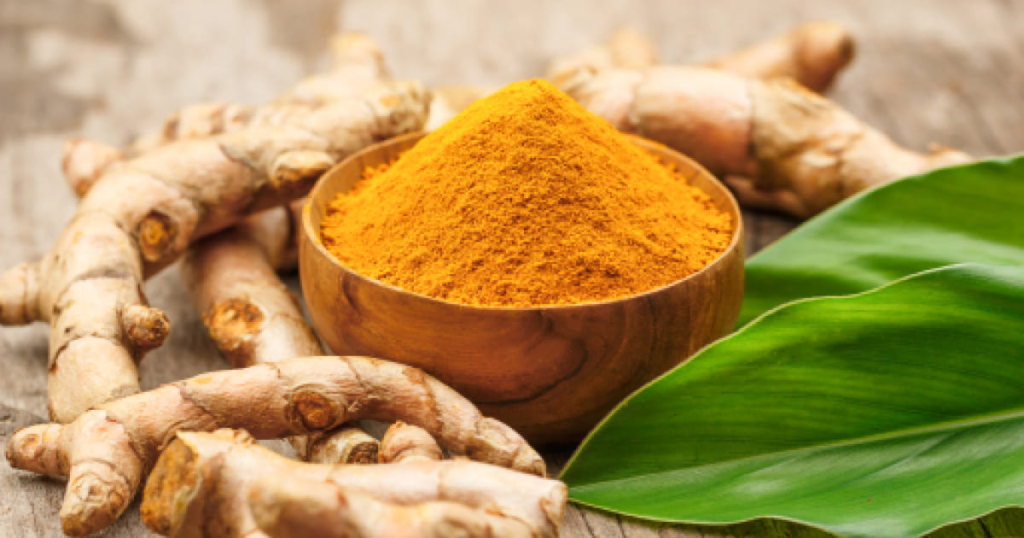Curcumin is an active ingredient from the Zingiberaceae plant and is widely used in skin care products and pharmaceuticals. It has anti-inflammatory, antioxidant, whitening and other effects, and is effective in improving skin condition and preventing aging. This article will give a comprehensive introduction to the chemical properties, efficacy and effects of curcumin.

Sources of Curcumin
- Curcumin is mainly derived from the genus Curcuma, which grows in tropical Asia.
- This plant is widely distributed in India, China, Thailand and other places, and is a common spice in Asian cuisine and traditional Chinese medicine.
- Ginger contains a large amount of curcumin, and the extraction method is usually from fresh-cut or dried rhizomes.
Benefits of Curcumin
Curcumin is an important bioactive ingredient from the ginger family. Its wide range of physiological functions makes it widely used in medicine, food and skin care products. Its main effects include anti-oxidation, anti-inflammatory, whitening, acne removal, etc., which can effectively improve a variety of skin problems.
Effects of Curcumin on Skin
Research shows that curcumin, as a natural plant compound, has many skin health functions. It not only effectively inhibits inflammation and reduces skin redness and swelling, but also promotes collagen synthesis and improves skin elasticity, thus reducing fine lines and wrinkles and improving overall skin texture. At the same time, curcumin also shows significant antioxidant activity, which can protect the skin from free radicals and maintain skin health.

Anti-inflammatory effects of curcumin
As a powerful natural anti-inflammatory agent, curcumin can effectively relieve symptoms such as skin inflammation and redness. The bioactive compound contained in it, kulkumin, can inhibit the production of inflammation-related factors, thereby playing an anti-inflammatory role. At the same time, curcumin can also enhance the immune function of the skin and improve its ability to resist external stimuli.
Antioxidant Effects of Curcumin
Curcumin is a powerful natural antioxidant that can neutralize free radicals and protect the skin from oxidative stress. Its unique molecular structure gives it excellent electron supply ability, which can effectively remove active oxygen in the skin, reduce oxidative damage, and maintain cell membrane integrity. It can also inhibit excessive melanin production and play a whitening role.
Whitening effect of curcumin
Curcumin is a powerful natural antioxidant that can effectively inhibit the production of melanin, thereby producing a whitening effect. It can inhibit the activity of tyrosinase, reduce the synthesis of melanin, and make the skin whiter and brighter. At the same time, curcumin can also inhibit the activity of free radicals and reduce the deposition of melanin caused by light or haze, thereby improving skin color and fading spots.
Curcumin’s acne-fighting effects
Curcumin can play multiple roles in helping to improve acne problems. Its powerful anti-inflammatory properties can inhibit skin flare-ups and prevent the formation and deterioration of acne. At the same time, its excellent antioxidant capacity can regulate sebum secretion, clean clogged pores, and promote the repair of damaged skin. In addition, curcumin also has a certain whitening function, which can reduce the pigmentation left by acne.

Turmeric-based skincare products have become increasingly popular due to their potent benefits for skin health. Derived from the turmeric plant, specifically its active compound curcumin, these products are celebrated for their anti-inflammatory and antioxidant properties. Curcumin helps to calm and soothe the skin, making it particularly effective in reducing redness, irritation, and inflammation associated with conditions like acne, eczema, and rosacea.
Additionally, turmeric is rich in antioxidants, which protect the skin from free radical damage. Free radicals, generated by exposure to UV rays and environmental pollutants, contribute to premature aging by breaking down collagen and elastin fibers in the skin. By neutralizing these free radicals, turmeric helps to maintain skin elasticity, minimize fine lines, and prevent dark spots.
Moreover, turmeric is renowned for its brightening effects on the skin. It inhibits melanin production, which can lead to hyperpigmentation and uneven skin tone. Regular use of turmeric-based skincare products can therefore result in a more even complexion, with reduced appearance of dark spots and blemishes over time.
Turmeric also possesses antibacterial properties that can help combat acne-causing bacteria, promoting clearer and healthier-looking skin. Whether used in masks, serums, creams, or cleansers, turmeric-infused products offer a natural and holistic approach to skincare. They provide effective solutions for a wide range of skin concerns while harnessing the healing and protective benefits of this ancient spice. Incorporating turmeric into your skincare routine can contribute to achieving radiant, youthful, and balanced skin.
